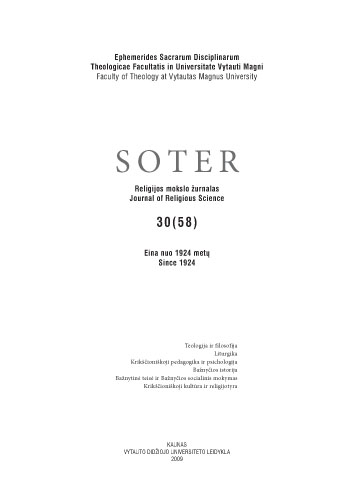Palaimintojo J. Matulaičio teologinės minties aktualumas dabarties problemų kontekste
THE RELEVANCE OF THEOLOGICAL THOUGHT OF THE BLESSED J. MATULAITIS IN THE CONTEXT OF MODERN PROBLEMS
Author(s): Rimas SkinkaitisSubject(s): Christian Theology and Religion
Published by: Vytauto Didžiojo Universitetas
Keywords: kristocentrizmas; meilė; tarnystė; ugdymas; dialogas; christocentrism; love; service; education; dialogue
Summary/Abstract: Christocentrism is typical to J. Matulaitis theological heritage. The Blessed J. Matulaitis treated Christian life in terms of faith and from the point of view of Christ's person. His christocentristic perspective underwent gradual formation. If in Fribourg Matulaitis often repeated Deus in omnia inferre, so in Vilnius period his main slogan was Christum in omnia inferred. It is a clear slip from “abstract” faith to more personal relation between a human person and the Savior. According to him, christocentrism discloses God's kenosis and immanence. Furthermore, God incorporates his divinity in Jesus' person, making human person very noble. In Jesus' person we see the image of serving God, who becomes a model of thought and activity to Matulaitis. Thus the image of God and Man becomes the model of love. Love, as seen by Matulaitis, is a dynamic and developing process, directing a human being to God and perfecting him as a creature. So realization and actualization of love must start from the human person. Matulaitis claims self-education to be the most important cultural, intellectual, scientific and spiritual activity. Only a highly-educated and mature personality can understand social dynamics, different challenges and arrange the solution of the problems. This way Matulaitis stresses the importance of individual education and its development. Individuality, nurtured in the light of faith, becomes the enrichment of all the society and standoff to egoism. In the nurturing of human individuality, the dimension of human integrity is very important. In Matulaitis times, there flourished definite dualism, distinguishing between human body and soul. Matulaitis considers a human being as undivided oneness, with equally valuable bodily and spiritual springs. So the mystery of Incarnation enables him to speak about the value of human body, what was not common to the Church of those days. Describing the positiveness of a body and the material world in general, Matulaitis encourages the believers to take an active part in solving severe social problems of those times. As the most important task, he points to the education, training and exercising of the society. Christ's concern about human social life inspired the Blessed J. Matulaitis with the same spirit. He understood that spiritual, cultural and ideological human education forms value-system, which later gives background to social, cultural, economical and political lives of any country. This attitude enabled him tirelessly to take care about the education and training of the society. Theological christocentrism and the imperative of love acquired in Matulaitis great tolerance and forgiveness to all the people with different ideas, feelings and beliefs. The ideas of a dialogue and ecumenism are very vivid in his theology. The analysis of the model of St. Trinity's life and St. Paul's theology, especially in 1 Cor 9, 20-22, helped him to become a herald of unity, tolerance and ecumenism. During his
Journal: SOTER: religijos mokslo žurnalas
- Issue Year: 58/2009
- Issue No: 30
- Page Range: 49-59
- Page Count: 11
- Language: Lithuanian

